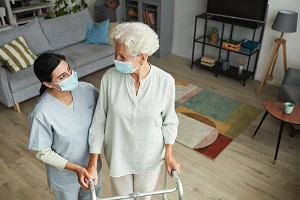COVID-19 Prevention in Assisted Living Facilities Long-term care facilities provide a variety of services, both medical and personal care, to people who are unable to live independently.
Assisted living facilities (ALFs) are at high risk for SARS-CoV-2 spreading among their residents. If infected with SARS-CoV-2, the virus that causes COVID-19, assisted living residents, often older adults with underlying medical conditions, are at increased risk for severe illness.
COVID-19 Prevention in Assisted Living Facilities course is designed to educate healthcare providers (HCP) on how to protect themselves and others and mitigate community transmission of COVID-19 in Assisted Living Facilities (ALF).
The CDC is aware of verified COVID-19 cases among ALF residents in several states. Experience with nursing home outbreaks has shown that residents with COVID-19 may not report common symptoms, and some may not report any symptoms at all. Consequently, asymptomatic and pre-symptomatic infections that go unnoticed are likely to contribute to transmission in these contexts.
Education on COVID-19 and prevention measures is crucial for residents, guests, and staff. Remind personnel to practice social distancing while in break rooms and common areas, cancel non-essential meetings, and consider alternate methods for essential meetings (e.g., virtual).
Furthermore, the COVID-19 Prevention in Assisted Living Facilities course is designed to educate healthcare providers (HCP) on how to protect themselves and others and mitigate community transmission of COVID-19 in Assisted Living Facilities (ALF).
What You’ll Learn
- CDC Guidance for Assisted Living Facilities
- Provide Supplies and Implement Infection Prevention and Control
- Learn How to Respond to Residents with Suspected or Confirmed COVID-19
- Identify a Point of Contact
- Encourage Social Distancing
Details
Course length: 30 minutes; CME 0.75
Languages: American English
Key features: Audio narration, learning activity, and post-assessment
Get Certified
American Medical Compliance (AMC) is a leader in the industry for compliance, Billing, and HR solutions. To become certified, please visit us at American Medical Compliance (AMC).
Explore our other courses by visiting the AMC Course Library.
COVID-19 Prevention in Assisted Living Facilities
Assisted living facilities play a crucial role in protecting the health and well-being of their residents. Moreover, this is especially true during a global health crisis like the COVID-19 pandemic. These facilities cater to elderly individuals and those with underlying health conditions. This makes them more vulnerable to severe illness caused by the virus. Therefore, implementing effective prevention measures becomes paramount in ensuring the safety of residents and staff members alike.
The Importance of Preventing COVID-19 in Assisted Living Facilities
Preventing the spread of COVID-19 in assisted living facilities is of utmost importance due to the vulnerability of the residents who reside there. Elderly individuals and those with underlying health conditions are at a higher risk of experiencing severe illness. By implementing effective prevention measures, these facilities can safeguard the health and well-being of their residents and reduce the risk of outbreaks. Additionally, preventing the spread of COVID-19 within assisted living facilities contributes to the larger community’s efforts to control the pandemic. As these facilities often have close interactions with the outside world through staff, visitors, and healthcare providers, containing the virus within their walls helps in curbing its transmission to the broader population. The well-being of residents, staff, and the wider community depends on the diligent implementation of preventative measures to minimize the impact of COVID-19 in assisted living facilities.
The Importance of Compliance with CDC Guidance
Adhering to the guidance provided by the Centers for Disease Control and Prevention (CDC) regarding COVID-19 safety is of paramount importance. The CDC’s recommendations are based on extensive scientific research and expertise, making them a reliable and trusted source of information. By following these guidelines, individuals and communities can effectively mitigate the risk of contracting and spreading the virus. Adhering to CDC guidance ensures that we are employing the best practices for personal protection. This includes wearing masks, practicing physical distancing, and maintaining proper hand hygiene. Moreover, these guidelines help safeguard vulnerable populations, such as the elderly and individuals with underlying health conditions. Consistently following CDC guidance plays a vital role in curbing the transmission of COVID-19.
Benefits of an Online COVID-19 Prevention in Assisted Living Facilities Course
Online courses offer numerous benefits that make them a popular choice for learning in today’s digital age. Firstly, flexibility is a key advantage. This is because online courses allow learners to access course materials and participate in lessons at their own pace and on their own schedule. Additionally, online courses provide a wide range of subjects and disciplines. This gives learners the opportunity to acquire new skills from the comfort of their own homes. Lastly, the affordability of online courses compared to traditional in-person education is a significant advantage. Online courses make quality education more accessible and affordable for many individuals. With the ability to access course materials anytime, anywhere, online courses offer a flexible, diverse, interactive, and cost-effective approach to continuing education.



